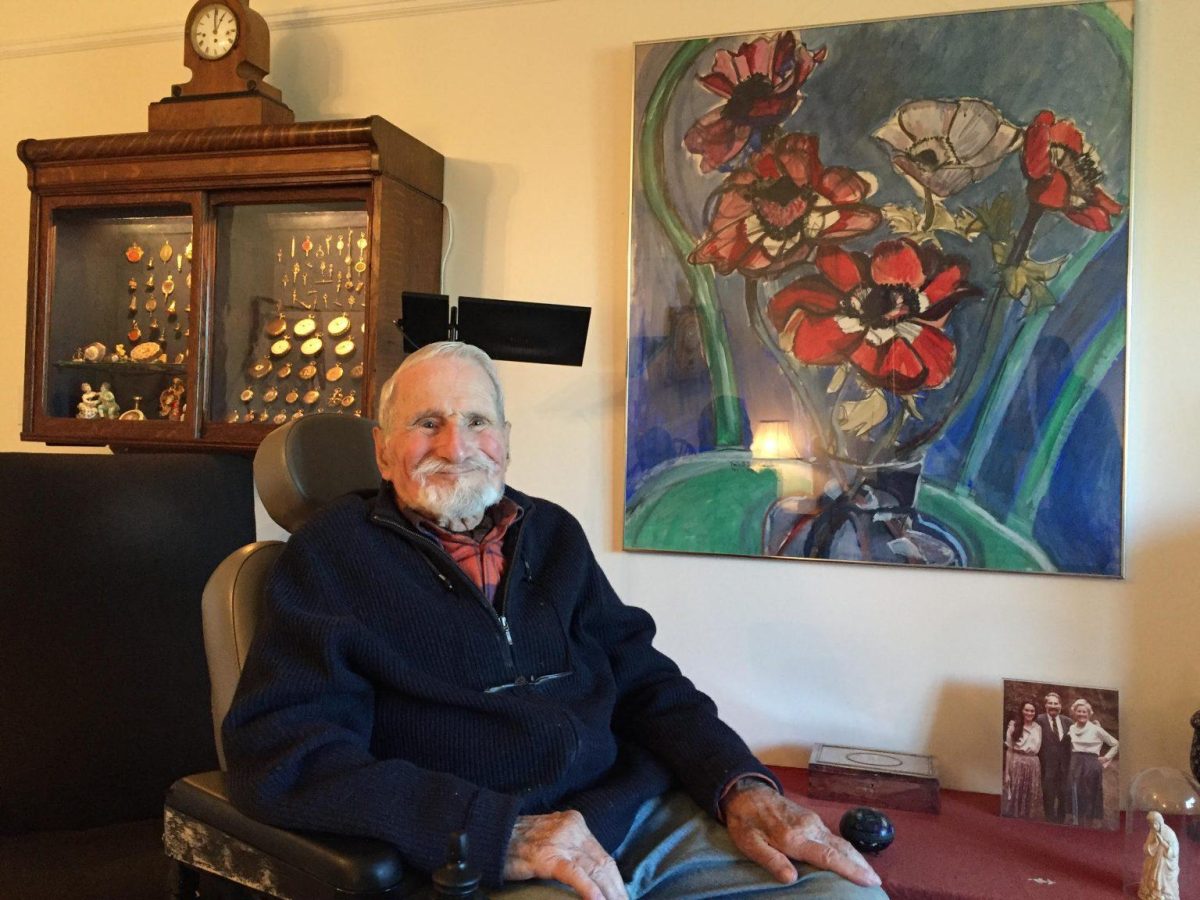There are many professors with strong opinions at the College. The truly great are those who not only have strong opinions, but who are also good teachers as well, able to draw out and engage with students holding opposing views.
Kurt Tauber was one such teacher. A professor of political science, department chair, Gaudino Scholar, and chair of the Gaudino Committee, Tauber retired in 1993 after teaching at the College for 33 years. He died last month at 101.
A Marxist, Professor Tauber was admired by those on the left as well as by libertarians and conservatives. One of his close friends on the faculty was one of the few conservatives there, Professor of Romance Languages Georges Pistorius. Tauber fled Vienna after the Nazi Anschluss in 1938; Pistorius fled Prague after the Communist coup in 1948.
Professor Tauber was an activist for causes he believed in, often participating in — and helping organize — protests. But his heart was in the classroom. He spent hours preparing for classes and grading our papers. He loved his students. He was a mentor to many, from the thesis students he advised to those who stopped by during regular office hours to talk about assignments, political theory, or campus life.
In these conversations as well as with his work on a variety of committees, Tauber sought to improve the learning environment at the College, wanting students to engage with professors and each other. He hoped we would continue our conversations after class, whether in The Log, the Baxter Snack Bar, or in dorms.
Professor Tauber was a champion of Robert Gaudino’s commitment to “uncomfortable learning,” encouraging experiences that could be unsettling. He favored bringing controversial speakers to campus. He believed that by challenging our assumptions, we would think more deeply about ideas and current events and consider more seriously the ideas of our fellow students, particularly those with whom we disagreed. These challenges helped us become better advocates for our own shared causes and better able to discuss and debate across our differences.
When the conservative anti-feminist activist Phyllis Schlafly was invited to campus in 1983, Tauber was delighted. Under his leadership, the political science department co-sponsored the talk, even funding the reception in the Stetson Faculty Lounge.
Professor Tauber considered the event a great success because it got people talking, arguing, and debating Schlafly’s ideas for a full week — and then some — after her talk. We didn’t always agree, but we listened to each other. Our conversations were civil, our tone respectful. Professor Tauber still remembered the event when I visited him last spring, nearly 40 years later.
I remember most powerfully the day in my senior year when we discussed the political philosopher Eric Voegelin in Tauber’s class, “Conservative Political Thought.” You read that right: This Marxist scholar taught a course in conservative thought. It was one of the best classes, if not the best class, I have ever taken — and I have taken a superabundance of classes. I have a JD as well as a PhD.
After he helped us unpack Voegelin’s complex ideas, I approached Professor Tauber, thanking him for his instruction. I added that, now that I understood Voegelin, I was thinking of replacing my libertarian conservatism with Voegelin’s more traditional brand of conservatism.
“You would do well to do that,” he replied, brightening.
“Professor,” I returned. “You made Voegelin’s ideas so clear and appealing, I almost thought you were a Voegelinian yourself.” A smile crept up between his whiskers, but he let me continue. I asked what he really thought of the thinker.
“It’s all bullshit, Dan, just bullshit,” he replied. Professor Tauber was fond of that term.
And then, together, we walked from Griffin 4 to his office in the rabbit warren of faculty offices in Stetson, where Sawyer Library now sits. The crisp fall air biting our cheeks, we discussed the merits of Voegelin’s ideas. He offered his Marxist view. I countered with arguments that he had only that day helped me articulate.
In his office, our conversation continued for about an hour, maybe more, until it was interrupted by a knock on the door. A colleague wanted to walk with him to a department meeting. Professor Tauber’s face fell. He apologized, regretting that he had to conclude our conversation. His facial expression that day has stayed with me throughout my life: A professor would rather have continued talking to me than meet with his colleagues. He respected my opinions, even when we disagreed. Professor Tauber helped me develop my own political philosophy, making me more confident in my own ability to express myself. He provided an example of intelligent disagreement.
I could not have engaged with Professor Tauber without him having so respectfully taught a thinker whose views were at odds with his own.
Classmates and fellow alums have offered similar stories about Professor Tauber. Those on his side of the aisle tell how he often critiqued their writing, pushing them to avoid sloppy thinking, to express themselves more clearly.
His mind remained sharp, even as his body was failing. When I visited him last April in his home at the Sweetwood of Williamstown retirement community, he asked about my life. We shared our love of opera, sparred over politics — but still managed to find some areas of agreement — and discussed history. Even though we continued to hold different positions on a great variety of issues, he was delighted that I remained intellectually engaged.
“I didn’t want to impose my views on anyone,” he told me.
“You didn’t,” I returned. “You encouraged me to think on my own.”
Mark Hopkins had a worthy heir in Kurt Tauber, a true embodiment of the Williams ideal.
B. Daniel Blatt ʼ85 lives in Los Angeles, Calif.





